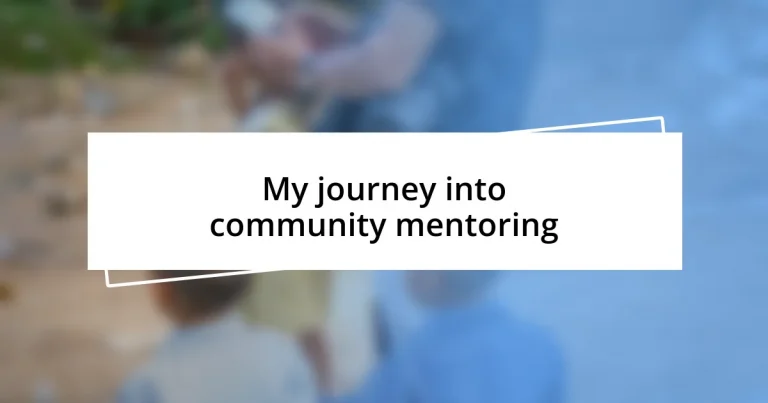Key takeaways:
- Community mentoring builds genuine relationships that foster inclusivity and shared growth, positively impacting both individuals and the broader community.
- Effective mentoring involves finding a personal style, such as being a supportive listener or a structured coach, and adapting it to the needs of the mentee.
- Open communication, consistency, and vulnerability are critical for building strong mentor-mentee relationships, leading to mutual trust and personal development.
- Celebrating successes, both big and small, enhances motivation and strengthens the bond between mentor and mentee, making achievements a collective triumph.
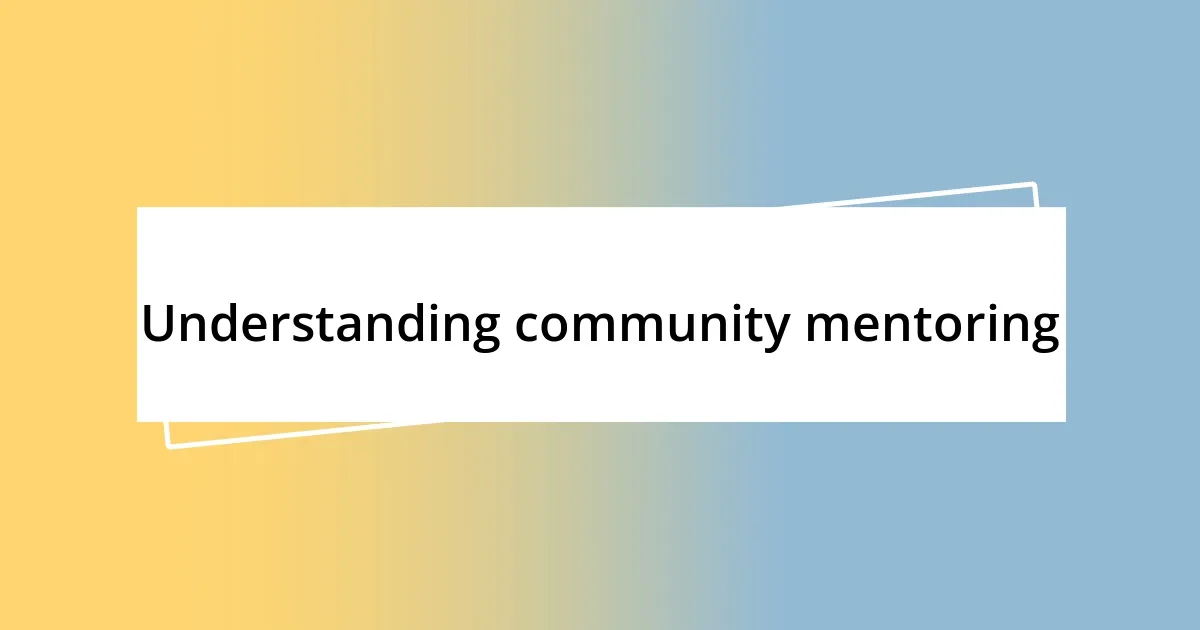
Understanding community mentoring
Community mentoring is more than just guidance; it’s about building genuine relationships rooted in shared experiences and mutual growth. I remember the first time I stepped into a mentee’s world, feeling both nervous and excited. What struck me most was how our conversations bridged gaps between us, turning abstract advice into tangible action steps that felt deeply personal.
At its core, community mentoring fosters inclusivity and empowers individuals. I often reflect on how a simple shared story can ignite hope or inspire courage. Have you ever found a spark of motivation in someone else’s journey? I know I have, and it reinforces my belief that mentoring isn’t just about teaching—it’s about learning together.
What I’ve found particularly enriching is the way community mentoring creates a ripple effect, influencing not just the mentor and mentee, but the entire community. I recall when one of my mentees took their newfound skills and passed them on to others, creating a chain reaction of support and growth. Isn’t it incredible to think about the vast potential we unlock when we choose to uplift each other?
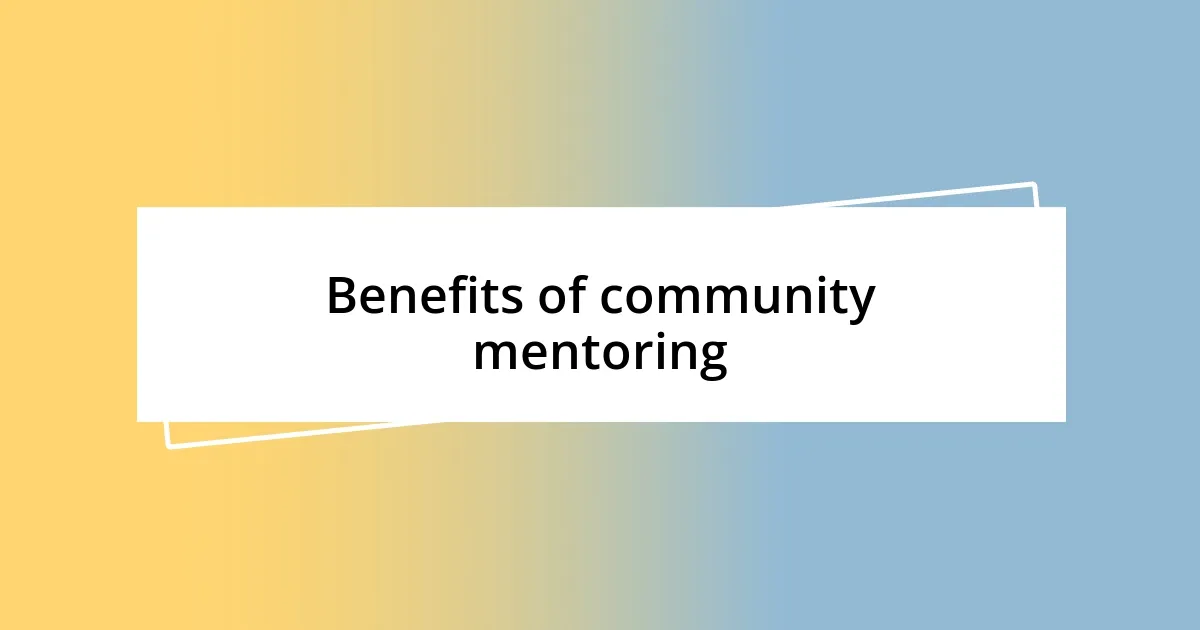
Benefits of community mentoring
One of the most significant benefits of community mentoring is the genuine sense of connection it fosters. I can’t help but smile when I think of a particular mentee who shared their dreams and fears with me. It was during those vulnerable moments that I realized how much we both grew from the experience. When we take the time to listen, we create bonds that not only uplift the individual but strengthen the entire community.
Here are some key benefits of community mentoring:
- Strengthens relationships: Building trust is essential for any relationship, and mentoring provides the perfect space for that.
- Encourages personal growth: Mentors and mentees alike gain fresh perspectives, enhancing their skills and resilience.
- Boosts confidence: As mentees tackle new challenges, I’ve seen their self-assurance blossom, often exceeding their own expectations.
- Creates a support network: Community mentoring connects individuals who share similar experiences, forming a supportive circle of friends and advocates.
- Promotes inclusivity: It brings together diverse backgrounds and experiences, enriching everyone involved.
In reflecting on these insights, I often find myself energizing my commitment to mentoring. Each connection made enriches not just the individuals involved but echoes throughout the community, creating an empowering environment for everyone.

Finding your mentoring style
Finding your mentoring style is quite the journey, isn’t it? When I first started, I was unsure of how to approach my role. I found that my natural inclination leaned toward being a supportive listener. I remember a specific instance when a mentee opened up about their struggles. It struck me how just being present and genuinely listening created a safe space for them to express themselves. This experience highlighted the importance of understanding what style works best for me—as it isn’t always about giving advice but sometimes just offering a shoulder.
As I dug deeper, I discovered various mentoring styles that resonated with my method. For instance, I found that blending a coaching style with my supportive nature brought out the best in my mentees. I think back to a time when I challenged a mentee to set specific goals while providing encouragement along the way. It was rewarding to witness their progress, blending motivation with accountability. The beauty of finding your mentoring style is realizing that it evolves, shaped by each unique interaction and connection.
In reflecting on these different approaches, I truly believe that self-awareness plays a critical role. I recall moments when I had to adapt my style based on a mentee’s personality. It’s fascinating how understanding myself better led to more effective mentoring. Sometimes, even subtle changes—like being more directive or allowing for open exploration—can significantly impact the growth of the relationship. Ultimately, finding your mentoring style isn’t a one-size-fits-all equation, but rather a personal evolution.
| Mentoring Style | Description |
|---|---|
| Supportive | Focusing on active listening and providing emotional support, allowing mentees to express thoughts and concerns freely. |
| Coaching | Encouraging goal-setting and offering structured guidance, promoting accountability while motivating mentees to reach their objectives. |
| Inspecting | Analyzing challenges with a solution-oriented mindset, diving deep into problem-solving with mentees for effective outcomes. |
| Facilitating | Creating opportunities for discussion and exploration, allowing mentees to share experiences and learn collaboratively. |
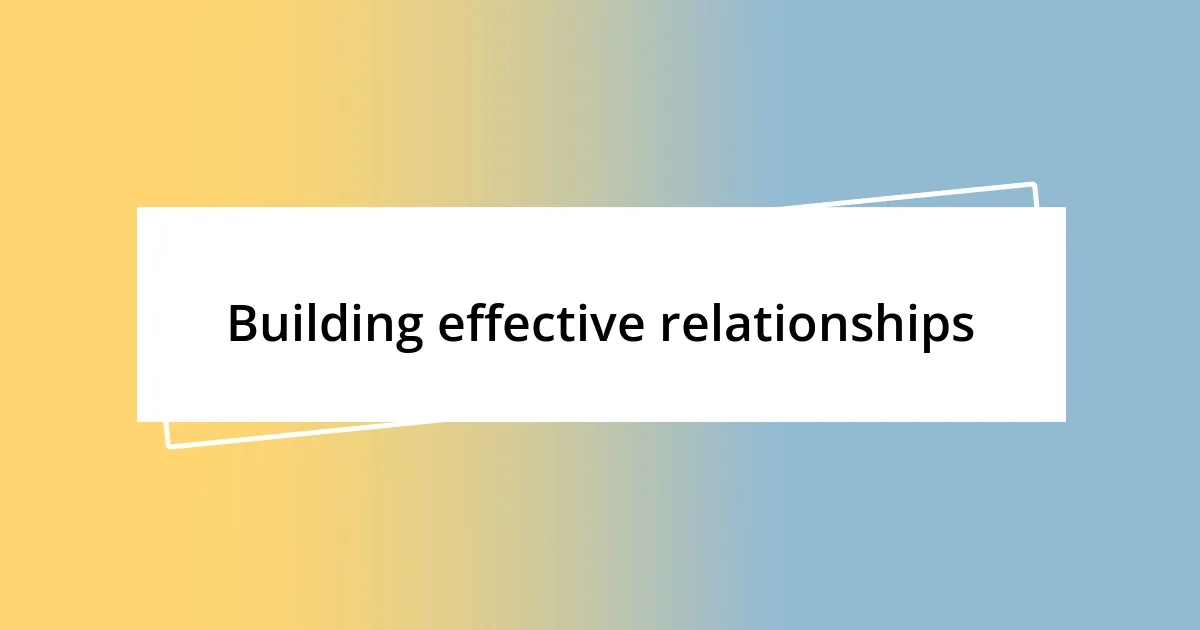
Building effective relationships
Building effective relationships in community mentoring often stems from sincere, open communication. I recall a moment when I first met my mentee. Instead of jumping into formalities, we engaged in a light-hearted conversation about our favorite hobbies. This simple starting point eased any initial nervousness we both felt. It was a reminder that strong relationships often begin with shared laughter and genuine interest.
As I’ve navigated my mentoring journey, I’ve learned that consistency is key. Regular check-ins, even if it’s just to ask how their day was, reinforce that I’m truly invested in their progress. On one occasion, a mentee mentioned feeling overwhelmed by personal challenges. I made it a point to reach out more frequently, showing my support and reminding them they weren’t alone in their struggles. These small gestures foster trust and deepen our connection over time, illustrating that relationships aren’t built only on grand gestures but on everyday actions.
Moreover, I find that vulnerability can create a powerful bond. Once, while discussing our aspirations, I shared a personal setback I experienced in my career. It was uplifting to witness my mentee’s eyes light up as they connected with my story. They eventually opened up about their own fears, creating an invaluable moment of trust. This shared vulnerability is what transforms a mentor-mentee relationship into a true partnership, where both parties feel seen and heard. Isn’t it remarkable how authenticity can pave the way for deeper connections?
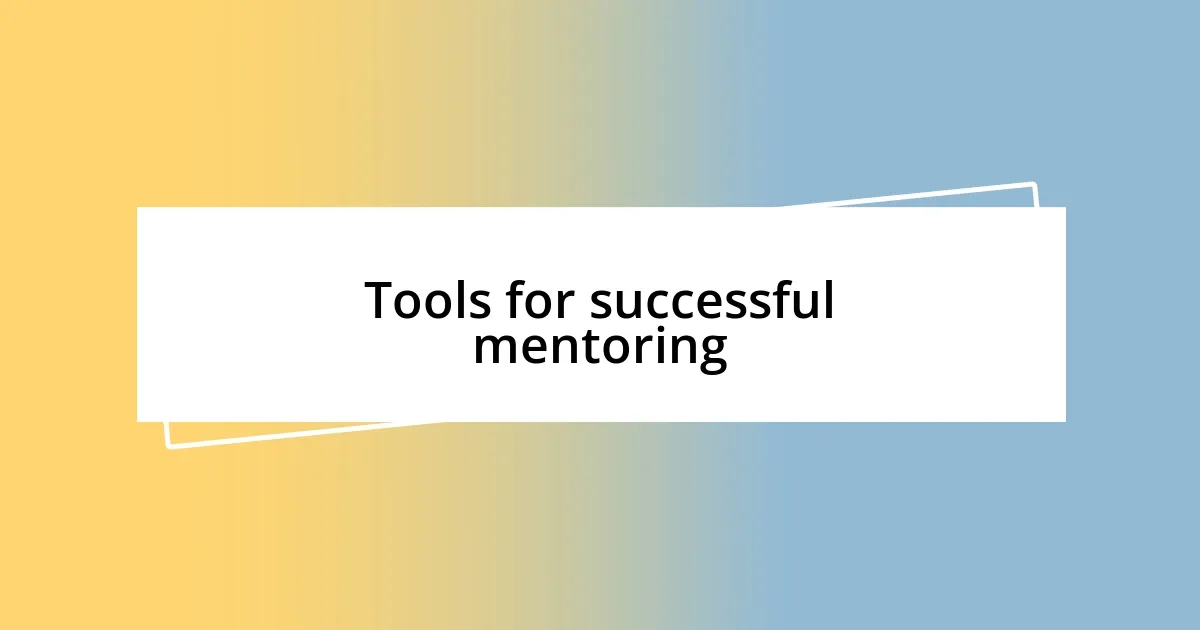
Tools for successful mentoring
When it comes to mentoring, having the right tools is essential for creating a fruitful experience. One tool I discovered early on was the power of goal-setting worksheets. These sheets became my roadmap, helping both my mentee and me clarify our objectives. I remember sitting down with a mentee, working together through the worksheet, and watching as their eyes lit up. It was incredible to see them grasp their ambitions and break them down into manageable steps—it felt like we were crafting a treasure map leading to their success.
Another valuable resource I utilized was a feedback loop. Establishing a habit of constructive feedback has been transformative for my mentoring relationships. I once received an unexpected piece of feedback myself—it was raw, but honest, and it hit me. That moment taught me the importance of fostering an environment where both mentor and mentee can candidly share thoughts. I started encouraging my mentee to express feedback about our sessions as well. This mutual vulnerability only served to strengthen our bond and allowed us to adapt our approach for even greater effectiveness.
Additionally, I can’t emphasize enough the significance of mentorship communities. Joining a local mentoring group introduced me to a wealth of experiences and perspectives that shaped my practice. I remember attending a workshop where a seasoned mentor shared a story about navigating challenges with their mentee. Hearing their approach inspired me to step outside my comfort zone, trying new methods that I hadn’t considered before. These communities foster continuous learning and connection, reminding me that mentorship isn’t a solitary journey but a vibrant tapestry woven together by the stories of many. Have you ever thought about how shared experiences can enrich your own mentoring toolkit?
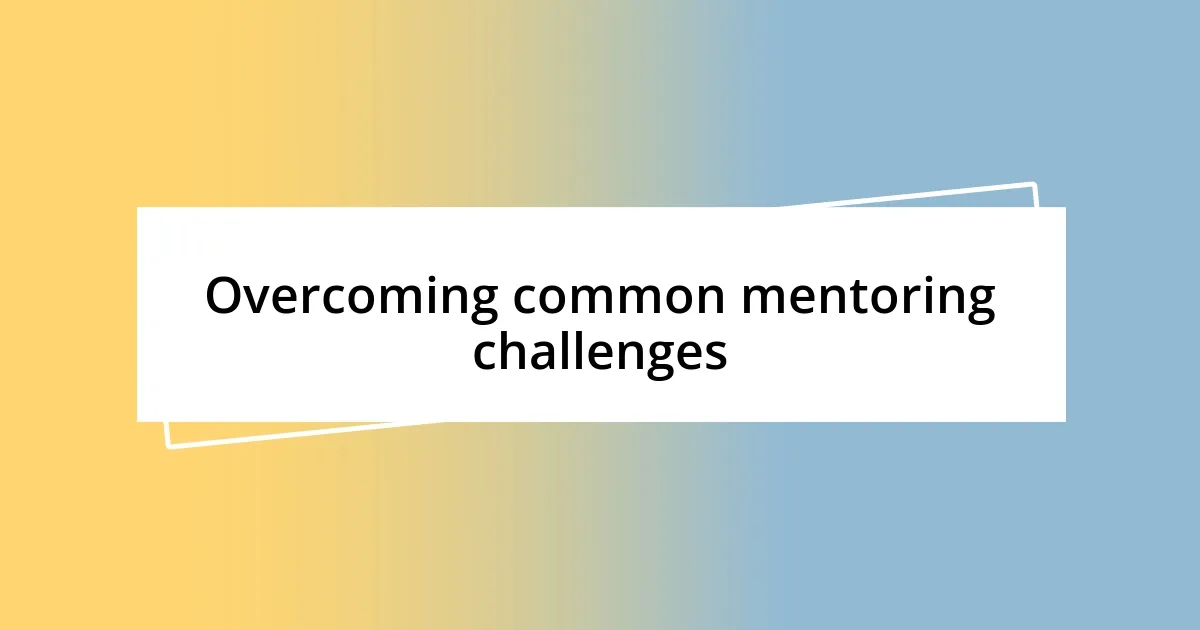
Overcoming common mentoring challenges
Mentoring can bring about its fair share of challenges, but addressing them head-on makes all the difference. I remember a time when my mentee struggled to open up about their feelings, fearing they might seem weak. It took some gentle probing, and in those moments, I learned the importance of creating a safe space. By sharing a recent struggle of my own, I found that it encouraged them to talk more freely. This experience taught me that vulnerability is often the key to unlocking deeper discussions.
Another challenge I faced was mismatched expectations. Once, my mentee and I had different ideas about the pace of our sessions. They wanted to dive deep into technical skills, while I believed attention to soft skills was equally important. To resolve this, we had an honest conversation about our goals, which helped us realign. It reminded me how crucial it is to check in regularly to ensure both mentor and mentee are on the same page. Have you ever found yourself in a similar situation, where clarity could have turned things around?
Lastly, navigating the emotional ups and downs can be quite daunting. I recall a particularly tough moment when a mentee expressed feelings of self-doubt after a setback. Their voice trembled as they spoke, and it hit me hard. I realized the importance of actively listening—not just hearing but being fully present with them in that moment. These experiences have shown me that sometimes, being a mentor means simply walking alongside someone in their pain and reflecting back their strengths to help them see what they might overlook. It’s an honor to be part of someone’s journey in this way, isn’t it?
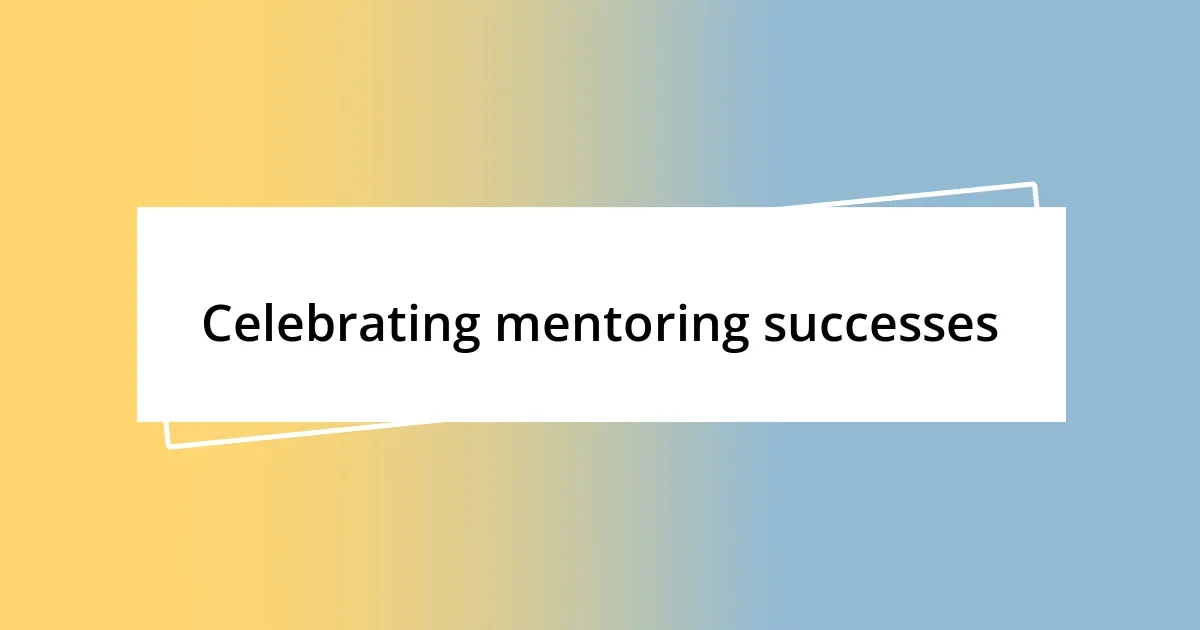
Celebrating mentoring successes
Celebrating the successes in mentoring isn’t just about recognizing achievements; it’s about feeling the shared joy and pride that comes with progress. Recently, I had the pleasure of witnessing my mentee nail their first public presentation after months of preparation. The sheer happiness on their face as they received applause was unforgettable. In that moment, I realized that every small step mattered, transforming anxiety into accomplishment.
One of my favorite experiences in mentorship occurred when my mentee exceeded their own expectations in a challenging project. We had worked diligently together, and when the results came in, they were even better than we had hoped. Watching their confidence soar as they celebrated their success, I felt an immense sense of pride. It reinforced my belief that when mentors and mentees cultivate a supportive environment, successes become not just individual achievements but collective triumphs.
Recognizing these successes can significantly bolster motivation, and I love to commemorate them in simple yet meaningful ways. I often suggest creating a “success jar” where we jot down milestones and rewarding moments throughout our journey together. It serves as a tangible reminder of how far we’ve come and inspires us to envision the possibilities ahead. Have you ever tried something like this? Reflecting on achievements can truly uplift spirits and reinvigorate the mentoring relationship.












